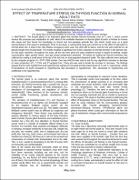EFFECT OF TEMPERATURE STRESS ON THYROID FUNCTION IN NORMAL ADULT RATS

View/
Date
2019-06-19Author
kudamba, Ali
kisakyi, John Joseph
okurut, Alemu Shaban
Walusansa, abdul
Gul, safia
Metadata
Show full item recordAbstract
The thyroid gland is an important gland that secretes thyroid hormones such as T3 and T4 which control
various life processes and metabolism in cells. Most of the available literature on thyroid gland function is limited to humans
who sweat and less furred but knowledge on furred and non-sweating animals like rats which could serve as a good
representative in this aspect is inadequate. Prior to the study, a confounding study was carried out on the effect of starvation in
normal adult rats. A total of ten rats (Rattus norvegicus) were used, five were left to starve, and the rest were well fed on rat
pencils bought from Nuvita feeds. The results revealed a significant (p=0.001) reduction in thyroid function in the starved rats.
On this basis, therefore, throughout the study, all the rats were given the same treatment except in regard to feeding, oxygen
concentration, light, genetic factor, and age except temperature treatment. The blood for testing the thyroid hormones was
collected by cutting a small piece of the tip of the tail into an anticoagulant (heparin) bottle. The data collected were analyzed
by the computer program XL--STAT 2008 version. One way-ANOVA was used to test for any significant increase or decrease
in mean production ofT3, T4TSH, and FT4andpost Hoc, Tukey test was used to locate the increase or decrease. The findings
showed that for both hypothermia and hyperthermia registered increased and decreased levels of T3 and T4 respectively. Unlike
FT4levelwhere its level increased in hyperthermia and decreased in hypothermia, TSH, decreased in hypothermia and
unaffected in the hyperthermia
Collections
- Research Papers [57]
